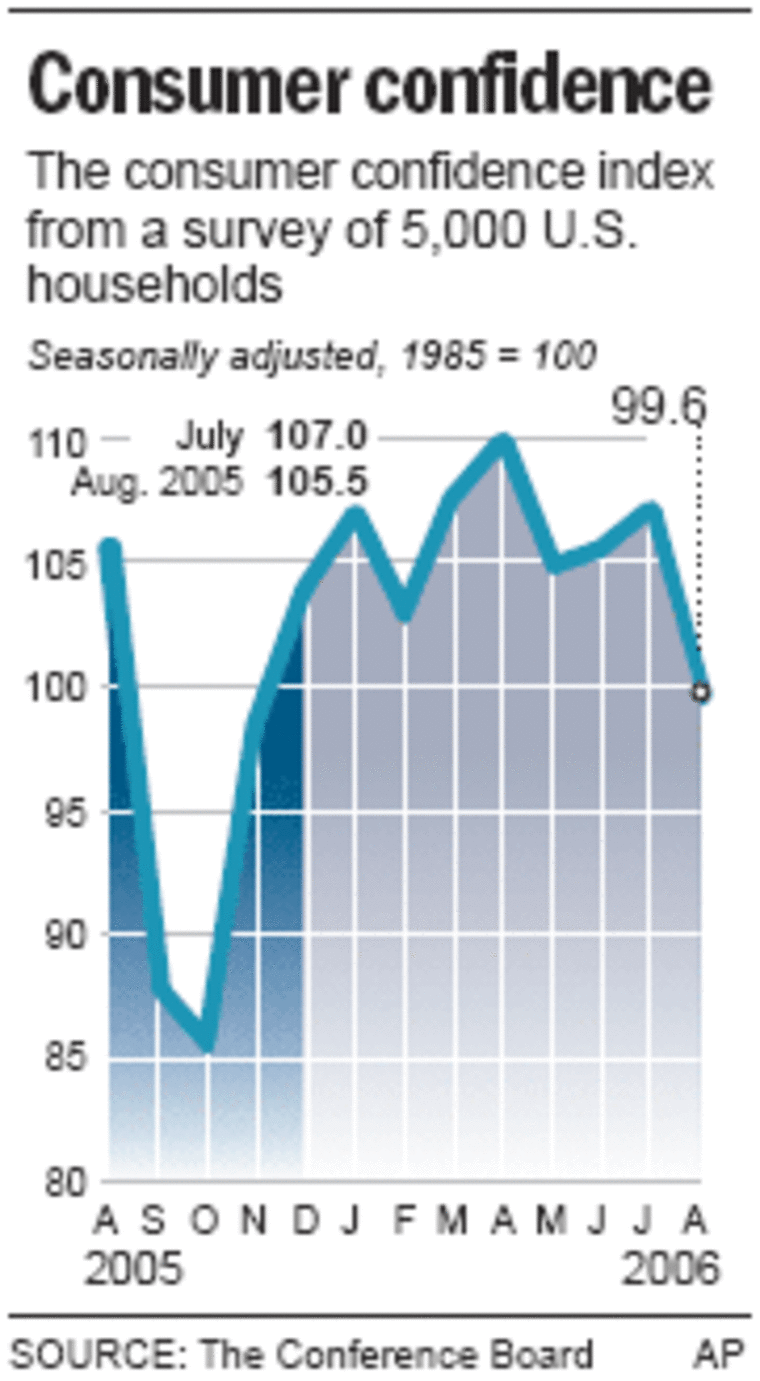Seems that everyone, from the average American balking at bills to the head honchos at the Federal Reserve, is asking not if the U.S. economy will slow, but how sharply.
Consumer confidence tumbled this month due to worries about the job market, high fuel costs a lagging housing market and unrest in the Middle East.
At the same time the Fed, which paused its two-year rate hiking campaign earlier this month, is expressing concern that any more rises could cripple the economy.
Consumer confidence fell more than analysts expected in August to its lowest level in nine months, the Conference Board, a New York-based research group, said Tuesday. A big reason was job-related worries: In July, the unemployment rate rose to a five-month high of 4.8 percent as employers added just 113,000 new jobs.
The Conference Board’s consumer confidence index fell to 99.6 from 107.0 in July. The last time the index was lower was in November, at a reading of 98.3.
There are still more consumers who feel business and labor conditions are favorable than unfavorable, but that gap is closing, economists noted.
“It confirms that the economy is slowing down, that things are cooling off a bit, and that consumers are little bit more concerned about the job situation than they were earlier this year,” said Gary Thayer, chief economist at A.G. Edwards & Sons Inc. in St. Louis.
He added that while consumer sentiment and consumer behavior don’t correspond precisely, the sentiment index “can show potential changes in spending.”
The economic outlook isn’t apocalyptic: Data on personal spending for July will be released on Thursday, and analysts are expecting an increase from June. They are also expecting Friday’s data on job creation and personal spending for August to come in stronger than in July.
Also, retail gasoline prices have fallen more than 5 percent over the past month — providing some relief to people’s budgets.
And so far, dwindling confidence in the economy hasn’t been a major drag on spending. In fact, consumers in the Conference Board’s survey reported small increases in their plans to buy homes and major appliances.
“What people say and what people do don’t always correspond,” said Stuart G. Hoffman, chief economist for the PNC Financial Services Group in Pittsburgh. “We don’t know yet if this confidence number drop will hurt the back-to-school selling season.”
But what’s clear is that this month’s drop — the largest one-month decline since Hurricane Katrina ravaged the Gulf Coast a year ago — suggests a widespread expectation of slower growth in the coming months, said Lynn Franco, director of the Conference Board’s consumer research center.
“You’ve got a deterioration in business conditions coupled with lackluster job growth,” Franco said.
Consumer confidence has been volatile this year, with rising interest rates, high energy prices and fighting in the Middle East weighing on Americans’ view of how the U.S. economy is doing. The thwarted terror threat in London earlier this month also worried U.S. consumers, Hoffman said.
Americans’ view of the labor market worsened in August. Consumers saying jobs are “plentiful” decreased to 24.4 percent in August from 28.6 percent in July, and those saying jobs are “hard to get” rose to 21.1 percent from 19.6 percent.

The report was derived from responses through Aug. 22 to a survey mailed to 5,000 households in a consumer research panel.
Inflation worries remain high as well, even with the recent retreat in gasoline prices.
“Consumers are feeling their dollars are getting stretched a little thin,” Franco said.
The average retail price for a gallon of regular, unleaded gasoline was $2.84 on Tuesday, down more than 5 percent from $3.01 a month ago. If that trend continues, it would help boost consumer confidence, Thayer said, but other troubles in the economy may overshadow improvements in fuel costs.
“We still have difficult times ahead for the economy — automakers are reducing output over the next couple months, and that could trickle through to other sectors,” Thayer said.
Consumers saying overall conditions are “good” fell to 26.1 percent in August from 27.3 percent in July. Those saying conditions are “bad” rose to 16.7 percent from 15.0 percent.
Stocks rose Tuesday after the release of the Fed minutes, which market participants took as evidence that the monetary tightening campaign could be over.
“Most members anticipated that inflation pressures quite possibly would ease gradually over coming quarters and the current stance of policy could well prove to be consistent with satisfactory economic performance,” the minutes said.
Meanwhile, oil prices fell below $70 a barrel Tuesday in New York, as an Atlantic storm veered away from the Gulf coast oil refining region.
Analysts are expecting the Labor Department to report on Friday a bigger rise in job growth for August than in July, and for the unemployment rate to edge lower to 4.7 percent.